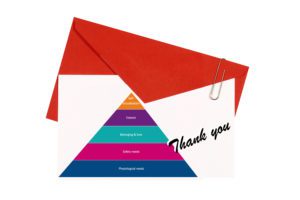
How can a simple gesture give work more purpose?
How can a simple gesture give work more purpose? 1. Send a note: This past
Last week I saw a wonderful post on Facebook (from @KarlyWhitaker) that read:
“Who knows why we were taught to fear the witches,
and not those who burned them alive.”
Yes! Who were all those men (…and, yes, some women) standing round the burning stake, watching the scold’s bridle be fixed in place, enjoying the public humiliation or applauding as the ducking stool went under the water for the tenth time? [Note: If the woman chained to the stool drowned she was innocent (but dead); if she survived, she was definitely a witch and death duly followed].
I fear that too many corporate men are still standing by as working women endure the 21st century equivalent of the ducking stool: a development process that seeks to ‘improve’ women by making them an approximation of the male leaders who determine their fate.
Well, this International Women’s Day, I #ChooseToChallenge (and I also choose not to apologise for sounding a bit grumpy about this!). Can we stop fixing women and just sponsor and promote them already? (At roughly 50% of the global adult population in 2020, how can it be that women are still a huge minority from middle management up?). Let’s just get women into senior positions at scale and at speed.
It’s time to stop talking about the new normal and start creating it. Let’s radically rebalance workplace leadership and see what happens. It would be a huge experiment (a bit like testing to see whether the witch will sink or float). But no-one is likely to die and the stats tell us that bringing women’s magic into the upper echelons of the commercial world is likely to have positive results.
IMD’s Center for Equity, Inclusion and Diversity reminds us that:
Ducking the Issue
Taking a look at the current (ab)normal, we find in survey after survey that working women are suffering disproportionately from the negative effects of Covid-19. Let’s #ChooseToChallenge any man who is standing aside and letting their female partner shoulder more than 50% of the physical and mental work of running a household or family (and let’s challenge the cherry-pickers who just do the jobs they like, or the meanies who help begrudgingly and moan that their female partner’s a nag). Let’s #ChooseToChallenge any man who’s sat back (or forgotten) till a female colleague organizes (for example) the birthday cake for a colleague (and who then dismisses her as too soft or lacking gravitas). Let’s #ChooseToChallenge any man who’s let it slide when a woman is manterrupted, mainsplained or subjected to a manologue (or who’s characterized her as ball-breaking when she complains about it).
Women have more to contribute and we need men to challenge themselves and each other to listen and engage genuinely and with more self-awareness.
Like witches on a ducking stool, women’s efforts to balance confidence and competence often don’t end well. Too assertive and sure of herself: she’s an Ice Queen. Too affiliative and humble: she’s a Nice Queen. So many women at work feel damned if they do, and damned if they don’t.
The image of the wicked witch dates from the Middle Ages and has stood the test of time, right through to today’s so-called Feminazis (a term popularized by the late, not-so-great, Rush Limbaugh). Witches were demonized as gossips, accused of gathering in groups and slandering men. Leadership behaviour (standing for something) made them a scold; when they made things happen that men couldn’t do or didn’t understand, they were condemned for evil magic. If their potent potions (or their vindictive charms) threatened patriarchal power, they were ridiculed, vilified or destroyed.
From Patriarchy to Equity
Let’s be clear, the patriarchy still exists. It shouldn’t. But the goal is not some female-centric, man-hating, reverse discrimination. The goal is equity and inclusion. An equal chance for everyone. Cool idea, huh?
So here are some tired tropes you can #ChooseToChallenge with research:
Challenge for Change
By the year 2025, 75% of the global workforce will be made up of millennials. A majority of these future leaders actively seek out a diverse and inclusive workplace. Do we have to wait for my generation to retire or die off before diversity and inclusion can happen from bottom to top in our organisations? Surely we can find a way right here, right now to weave women fully into a rich tapestry of diversity? The key question to our male colleagues is: Will you #ChooseToChallenge when it’s your own career ambition that has to go on hold for a year or so? (Can you cede the way for a woman? Can you accept it as equitable? After all, women are negatively impacted by the maternity breaks they take in order to raise the next generation of workers).
Competence or Confidence
We’ve known for a number of years now, that both men and women suffer from impostor syndrome (though it’s women who are more willing and able to acknowledge it openly). The popular statistic (from internal Hewlett Packard research) is that women only go for roles when they have 100% of the skills, whereas men will put their hand up with just 60% of the skillset. Who’s the imposter? We all know some men who’ve been promoted for their shiny façades. We’ve seen them get into leadership roles for which they’re not really ready, and where their lack of substance does tremendous damage to their teams and organisations. Yet when ambitious men put their hands up for leadership we see them as brave, confident and willing to have a go… Isn’t that just ‘fake it till you (might) make it’? Why not #ChooseToChallenge the need for courage. Why not ENcourage instead? If as a commercial cohort, we all show the courage to promote a lot of humble, competent women till they represent 50% of leadership, we’d normalize female leadership and create a stack of role models. I bet that would make women more confident. Let’s Merkel-ise senior management and promote competent women because of their LACK of a shiny façade. Let them try their women’s witchery, let them dismantle the partriarchy… After all, it’s not like the current situation is perfect, is it? It’s time for some audacious large-scale experiments in diversity of thought and approach.
If you #ChooseToChallenge this International Women’s Day, I ask that you challenge through actions that are specifically designed to get a lot of women rapidly into senior leadership. Challenge the idea that its not fair (because neither are the status quo or the snail’s pace of change). Challenge the competent men who feel they’re losing out – make them reframe it as investing for a more expansive future. And challenge any loud, shiny charismatics who name and shame a woman on the rise as a witch, a bitch or a stitch-up.
______________________
Theatre-led Learning: If you’re interested in live or virtual workshops (for International Women’s Day 2021 or beyond), we have created engaging, experiential sessions addressing #ChooseToChallenge and bystander behaviour. Reach out to Sally Dellow ([email protected]).
Coaching: Whether you are male or female, an emerging or an established leader in Asia and beyond, we’re here to explore how you might benefit from working with an Executive Coach ([email protected]). Our coaches are expert in:
______________________

How can a simple gesture give work more purpose? 1. Send a note: This past


Which Witch Will YOU Stop Ducking? Last week I saw a wonderful post on Facebook


(…or how to stop hating your co-workers) Sometimes it happens like this: you’re merrily going